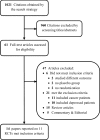SSRIs for hot flashes: a systematic review and meta-analysis of randomized trials
- PMID: 23888328
- PMCID: PMC3889979
- DOI: 10.1007/s11606-013-2535-9
SSRIs for hot flashes: a systematic review and meta-analysis of randomized trials
Abstract
Background: Hot flashes are the most commonly reported vasomotor symptom during the peri- and early post-menopausal period.
Objectives: To systematically review, appraise and summarize the evidence of the impact of different SSRIs on peri-menopausal hot flashes in healthy women in randomized, controlled trials.
Methods: A comprehensive literature search was conducted of MEDLINE™, EMBASE, the Cochrane Central Register of Controlled Trials, Web of Science and Scopus through March 2013. Two independent reviewers selected studies and extracted data. Random effects meta-analysis was used to pool outcomes across studies, and Bayesian mixed treatment methods were used to rank SSRIs in terms of effectiveness.
Results: We included a total of 11 randomized controlled trials with good methodological quality enrolling 2,069 menopausal and post-menopausal women (follow-up 1-9 months, mean age 36-76 years, mean time since menopause 2.3-6.6 years). Compared with placebo, SSRIs were associated with a statistically significant decrease in hot flash frequency (difference in means -0.93; 95 % CI -1.46 to -0.37; I(2) = 21 %) and severity assessed by various scales (standardized difference in means -0.34; 95 % CI -0.59 to -0.10; I(2) = 47 %). Adverse events did not differ from placebo. Mixed treatment comparison analysis demonstrated the superiority of escitalopram compared to other SSRIs in terms of efficacy.
Conclusion: SSRI use is associated with modest improvement in the severity and frequency of hot flashes but can also be associated with the typical profile of SSRI adverse effects.
Figures




References
-
- National Institutes of Health State-of-the-Science Conference statement: management of menopause-related symptoms. Ann Intern Med. 2005;142(12 Pt 1):1003–13. - PubMed
Publication types
MeSH terms
Substances
Grants and funding
LinkOut - more resources
Full Text Sources
Other Literature Sources
Medical

